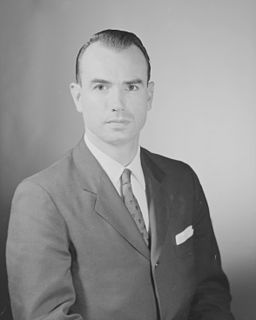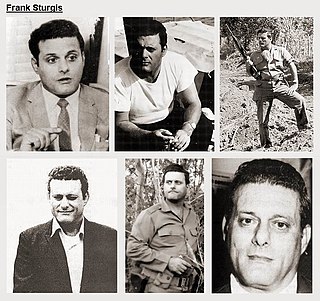 W
WThe Watergate Seven has come to refer to two different groups of people, both of them in the context of the Watergate scandal. Firstly, it can refer to the five men caught on June 17, 1972, burglarizing the Democratic National Committee's headquarters in the Watergate complex, along with their two handlers, E. Howard Hunt and G. Gordon Liddy, who were Nixon campaign aides. All seven were tried before Judge John Sirica in January 1973.
 W
WBernard Leon Barker was a Watergate burglar and undercover operative in CIA-directed plots to overthrow Cuban leader Fidel Castro.
 W
WVirgilio "Villo" R. González was a Cuban-born political activist, locksmith, and one of the five men arrested at the Democratic National Committee headquarters at the Watergate complex on June 17, 1972. The break-in led to the Watergate scandal and the eventual resignation of United States President Richard Nixon two years later.
 W
WEverette Howard Hunt Jr. was an American intelligence officer and author. From 1949 to 1970, Hunt served as an officer in the Central Intelligence Agency (CIA), particularly in the United States involvement in regime change in Latin America including the 1954 Guatemalan coup d'état and the 1961 Bay of Pigs invasion. Along with G. Gordon Liddy, Frank Sturgis, and others, Hunt was one of the Nixon administration "plumbers", a team of operatives charged with identifying government sources of national security information "leaks" to outside parties. Hunt and Liddy plotted the Watergate burglaries and other clandestine operations for the Nixon administration. In the ensuing Watergate scandal, Hunt was convicted of burglary, conspiracy, and wiretapping, eventually serving 33 months in prison. After release, Hunt lived in Mexico and then Florida until his death.
 W
WGeorge Gordon Battle Liddy was an American lawyer, FBI agent, talk show host, actor, and figure in the Watergate scandal as the chief operative in the White House Plumbers unit during the Nixon administration. Liddy was convicted of conspiracy, burglary, and illegal wiretapping for his role in the scandal.
 W
WEugenio Rolando Martínez Careaga was a member of the anti-Castro movement in the early 1960s, and later was one of the five men recruited by G. Gordon Liddy and E. Howard Hunt in 1972 for the Memorial Day weekend Watergate burglary at the Democratic National Committee (DNC) headquarters in Washington, D.C. He later worked as a real estate agent.
 W
WJames Walter McCord Jr. was an American CIA officer, later involved as an electronics expert in the burglaries which precipitated the Watergate scandal.
 W
WFrank Anthony Sturgis, born Frank Angelo Fiorini, was one of the five Watergate burglars whose capture led to the end of the presidency of Richard Nixon. He served in several branches of the United States military and in the Cuban Revolution of 1958, and worked as an undercover operative for the Central Intelligence Agency. Sturgis and Miami CIA head David Morales met with E. Howard Hunt shortly before the assassination of John F. Kennedy.